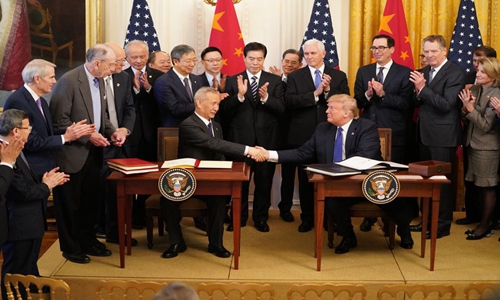Calls rise in China to rework deal with US: sources
By GT staff reporters Source:Global Times Published: 2020/5/11 19:33:41
Washington can't afford to restart trade war if everything goes back to square one

US President Donald Trump and Chinese Vice Premier Liu He, who is also a member of the Political Bureau of the Communist Party of China Central Committee and chief of the Chinese side of the China-U.S. comprehensive economic dialogue, shake hands after signing the China-U.S. phase-one economic and trade agreement during a ceremony at the East Room of the White House in Washington D.C., the United States, Jan. 15, 2020. (Xinhua/Wang Ying)
More hawkish voices have emerged within China on the phase one trade deal with Washington, with some calling for new negotiations and a tit-for-tat approach on spiraling trade issues, after US' malicious attacks on China ignited a tsunami of anger among Chinese trade insiders, the Global Times learned from sources close to the Chinese government.Inside China, dissatisfaction with the phase one agreement has been growing because China has made compromise for the deal to press ahead.
In the past, some trade negotiators believed that it would be worthwhile to make certain compromise to reach a partial truce in the 22-month trade war and ease escalating tensions. However, given US President Donald Trump's hyping an anti-China conspiracy that aims to cover up his mishandling of the COVID-19 pandemic, advisors close to the trade talks have suggested Chinese officials rekindling the possibility of invalidating the trade pact and negotiating a new one to tilt the scales more to the Chinese side, sources close the matter told the Global Times.
A former Chinese trade official told the Global Times on condition of anonymity on Monday that China could complete such procedures based on force majeure provisions in the pact.
"It's in fact in China's interests to terminate the current phase one deal. It is beneficial to us. The US now cannot afford to restart the trade war with China if everything goes back to the starting point," another trade advisor to the Chinese government told the Global Times, pointing to the staggering US economy and the coming of the US presidential election this year.
"After signing the phase one deal, the US intensifies crackdown in other areas such as technology, politics and the military against China. So if we don't retreat on trade issues, the US could be trapped," the former official noted.
Also on the US side, the deadly coronavirus has reduced its capacity to ship the quantity of products China needs, thus hampering its capability to carry out the deal, analysts said.
President Trump said on Friday that he was "very torn" about whether to end the China-US phase one deal, Fox News reported. Some observers interpreted his words as equating to a threat from the US to re-launch a trade war against China. In contrast to Trump's blasts, his trade officials said "good progress" was made on the deal implementation, after a phone call with Chinese Vice Premier Liu He several hours ahead on the same day.
Gao Lingyun, an expert at the Chinese Academy of Social Sciences who advises the government on trade issues, told the Global Times on Monday that China has "well documented" Washington's usual threats after previous rounds of confrontation.
That means if the trade war restarts, "China knows how to respond, and it is able to retaliate quickly and inflict serious harm on the US economy," Gao said.
But analysts noted that terminating the phase one trade deal would be China's "last option" and one that China would only resort to under extremely hostile conditions.
China has shown sincerity in the implementation of the phase one trade pact. As of the week ended May 2, Chinese buyers had ordered 40,200 metric tons of pork from US exporters, the biggest order in half a year, according to the US Department of Agriculture. Chinese buyers also purchased soybeans, cotton, sorghum and a small amount of beef from the US.
In January, China and the US signed the phase one trade agreement in Washington. Under the deal, China pledged to increase purchases of US products over the next two years while the US agreed to roll back tariffs in phases on Chinese goods.
Posted in: ECONOMY